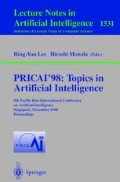Abstract
Requirements engineering is often characterised as the management of conflicts between the viewpoints of different stakeholders. This approach is only useful if there is some benefit in moving a specification from one viewpoint to another. In this study, the value of different viewpoints was assessed using a range of different models (ranging from correct to very incorrect), different fanouts, different amounts of data available from the domain, and different temporal linking policies. In all those models, no significant difference was observed between viewpoints.
Preview
Unable to display preview. Download preview PDF.
References
H. Bossel. Modeling and Simulations. A.K. Peters Ltd, 1994. ISBN 1-56881-033-4.
T. Bylander, D. Allemang, M.C. M.C. Tanner, and J.R. Josephson. The Computational Complexity of Abduction. Artificial Intelligence, 49:25–60, 1991.
D.J. Clancy and B.K. Kuipers. Model Decomposition and Simulation: A component based qualitative simulation algorithm. In AAAI-97, 1997.
J. DeKleer. An Assumption-Based TMS. Artificial Intelligence, 28:163–196, 1986.
J. Doyle. A Truth Maintenance System. Artificial Intelligence, 12:231–272, 1979.
S. Easterbrook. Elicitation of Requirements from Multiple Perspectives. PhD thesis, Imperial College of Science Technology and Medicine, University of London, 1991. Available from http://research.ivv.nasa.gov/~steve/papers/index. html.
S. Easterbrook. Handling conflicts between domain descriptions with computer-supported negotiation, Knowledge Acquisition, 3:255–289, 1991.
B. Feldman, P. Compton, and G. Smythe. Hypothesis Testing: an Appropriate Task for Knowledge-Based Systems. In 4th AAAI-Sponsored Knowledge Acquisition for Knowledge-Based Systems Workshop Banff, Canada, 1989
A. Finkelstein, D. Gabbay, A. Hunter, J. Kramer, and B. Nuseibe. Inconsistency Handling In Multi-Perspective Specification. IEEE Transactions on Software Engineering, 20(8):569–578, 1994.
H.N. Gabow, S.N. Maheshwari, and L. Osterweil. On Two Problems in the Generation of Program Test Paths. IEEE Trans. Software Engrg, SE-2:227–231, 1976.
A. Hunter and B. Nuseibeh. Analysing Inconsistent Specifications. In International Symposium on Requirements Engineering, pages 78–86, 1997.
A.C. Kakas, R.A. Kowalski, and F. Toni. The Role of Abduction in Logic Programming. In C.J. Hogger D.M. Gabbay and J.A. Robinson, editors, Handbook of Logic in Artificial Intelligence and Logic Programming 5, pages 235–324. Oxford University Press, 1998.
B. Kuipers. Qualitative Simulation. Artificial Intelligence, 29:229–338, 1986.
T.J. Menzies. Principles for Generalised Testing of Knowledge Bases. PhD thesis, University of New South Wales. Avaliable from http://www.cse.unsw.edu.au/~timm/pub/docs/95thesis.ps.gz, 1995.
T.J. Menzies. On the Practicality of Abductive Validation. In ECAI ’96, 1996. Available from http://www.cse.unsw.edu.au/~timm/pub/docs/96abvalid.ps.gz.
T.J. Menzies. Applications of Abduction: Knowledge Level Modeling. International Journal of Human Computer Studies, 45:305–355, September, 1996. Available from http://www.cse.unsw.edu.au/~timm/pub/docs/96abkl1.ps.gz.
T.J. Menzies and P. Compton. Applications of Abduction: Hypothesis Testing of Neuroendocrinological Qualitative Compartmental Models. Artificial Intelligence in Medicine, 10:145–175, 1997. Available from http://www.cse.unsw.edu.au/~timm/pub/docs/96aim.ps.gz
B. Nuseibeh. To Be and Not to Be: On Managing Inconsistency in Software Development. In Proceedings of 8th International Workshop on Software Specification and Design (IWSSD-8), pages 164–169. IEEE CS Press., 1997.
P. O’Rourke. Working Notes of the 1990 Spring Symposium on Automated Abduction. Technical Report 90–32, University of California. Irvine, CA., 1990. September 27, 1990.
D. Plexousakis. Semantical and Ontological Considerations in Telos: a Language for Knowledge Representation. Computational Intelligence, 9(1), February 1993.
A. D. Preece. Principles and Practice in Verifying Rule-based Systems. The Knowledge Engineering Review, 7:115–141, 2 1992.
R. Reiter. A Logic for Default Reasoning. Artificial Intelligence, 13:81–132, 1980.
C. Rich and Y.A. Feldman. Seven Layers of Knowledge Represeentation and Reasoning in Support of Software Development. IEEE Transactions on Software Engineering, 18(6):451–469, June 1992.
B. Selman and H.J. Levesque. Abductive and Default Reasoning: a Computational Core. In AAAI ’90, pages 343–348, 1990.
Author information
Authors and Affiliations
Editor information
Rights and permissions
Copyright information
© 1998 Springer-Verlag Berlin Heidelberg
About this paper
Cite this paper
Menzies, T., Waugh, S. (1998). On the practicality of viewpoint-based requirements engineering. In: Lee, HY., Motoda, H. (eds) PRICAI’98: Topics in Artificial Intelligence. PRICAI 1998. Lecture Notes in Computer Science, vol 1531. Springer, Berlin, Heidelberg . https://doi.org/10.1007/BFb0095262
Download citation
DOI: https://doi.org/10.1007/BFb0095262
Published:
Publisher Name: Springer, Berlin, Heidelberg
Print ISBN: 978-3-540-65271-7
Online ISBN: 978-3-540-49461-4
eBook Packages: Springer Book Archive

